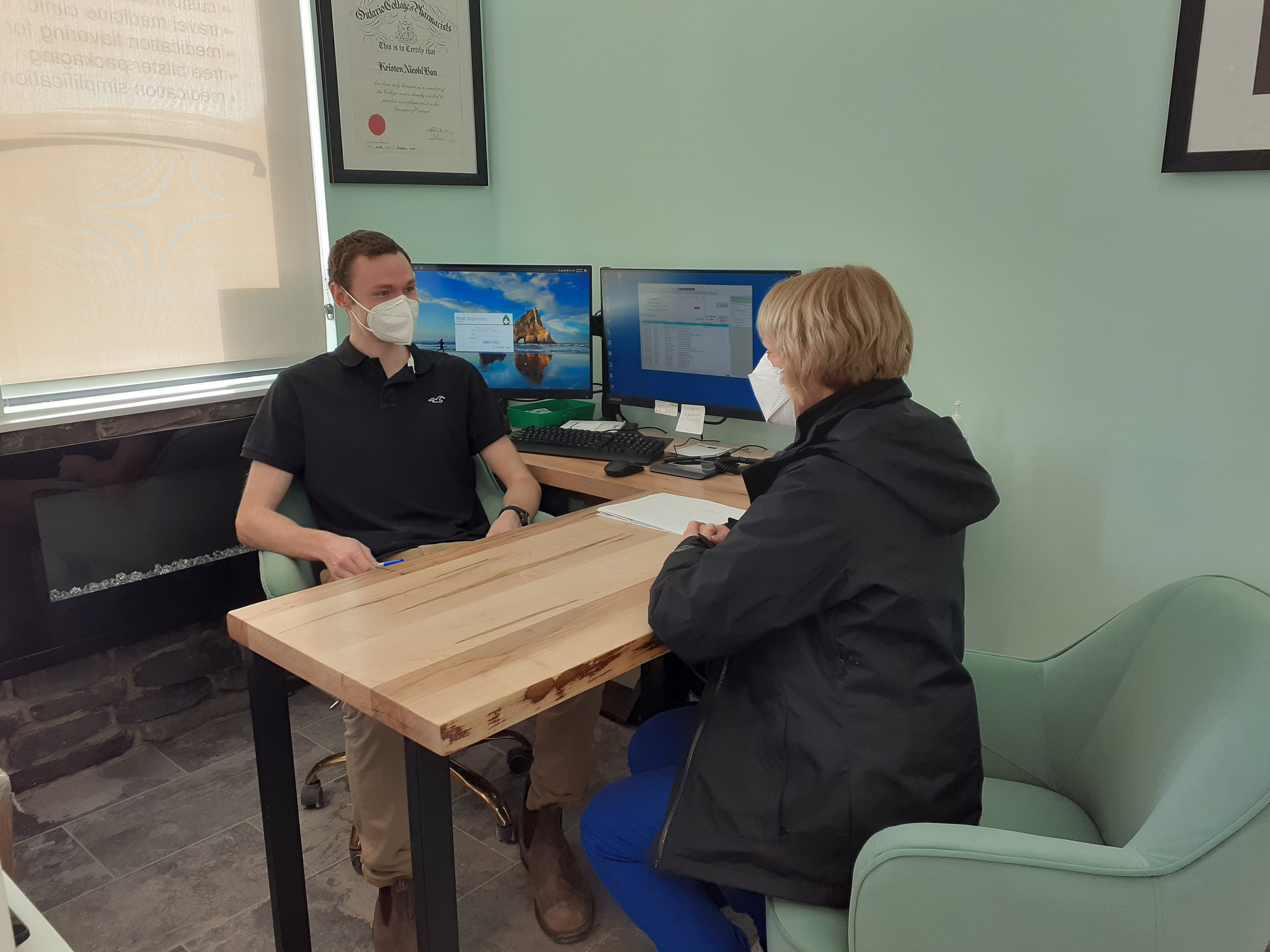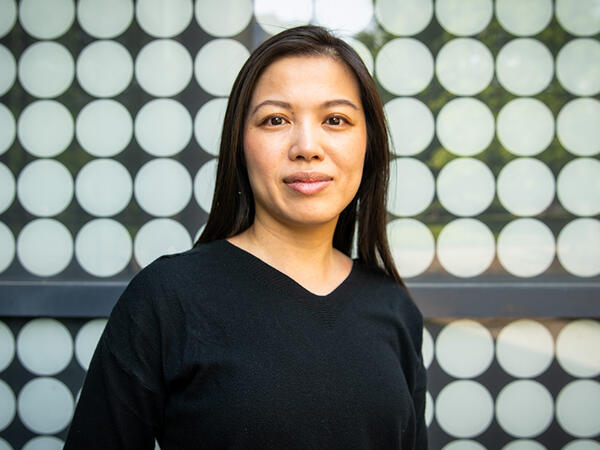In Southampton Ontario, pharmacist and pharmacy-owner Kristen Watt is leading a model of community practice that prioritizes clinical care and patient experience. From how the physical pharmacy space is organized to the scope of services provided, Watt is looking ahead to a future in community pharmacy where clinical responsibilities of the pharmacist are further expanded.
“We are an office-based community pharmacy,” said Watt (BScPhm 1T0) explaining how she has re-imagined her pharmacy’s space and workflow so that she and her Staff Pharmacists and students work from clinical office spaces rather than from the dispensary. Pharmacy technicians are primarily responsible for the bulk of medication dispensing processes, allowing pharmacists to focus on their patients’ clinical needs and experience.
“I became a pharmacist to be a clinical expert in pharmaceutical care. The model we have built here allows us to have all the necessary patient information at our fingertips,” said Watt. “It can be hard to counsel patients from across a counter or at a cash register. This approach is much more efficient and, from my experience, provides a higher level of care.”
“Whether it’s unaddressed symptoms they need support with or whether they are having difficulty finding appropriate coverage for health expenses. We’ll go the extra mile and take on those challenges because people deserve the best care.”
In addition to prescription-based interactions, the pharmacy offers appointment bookings for a range of services including medication management and de-prescribing, pain consultations, and diabetes management. If a patient’s needs fall outside the pharmacy’s scope, Watt will refer out to other specialists.
Currently pharmacy appointments are held virtually but Watt has found that having a dedicated, private space for meeting with patients improves the quality of the interaction and helps to build trust. “We tend to be the place where people go when they have a problem,” she said. “Whether it’s unaddressed symptoms they need support with or whether they are having difficulty finding appropriate coverage for health expenses. We’ll go the extra mile and take on those challenges because people deserve the best care.”

Community outreach expands access to care
The impact of Watt’s approach stretches beyond the walls of her pharmacy as she actively reaches out to provide expertise in palliative care at the local hospice and health services for Indigenous communities on the Bruce Peninsula.
When Watt first opened Kristen’s Pharmacy in 2017, she connected with the health centre at Saugeen First Nation and has since been invited to talk to the community about various health topics including diabetes management and smoking cessation. “When I opened, I was the closest pharmacy to the Saugeen First Nation, so I reached out to see what needs the community had. I have given some talks and the Elders would host dinners afterwards,” she said. “I’ve been able to provide support on deprescribing, substance use disorder management and harm reduction.”
Kristen’s Pharmacy services a large geographical area stretching across Grey and Bruce counties functioning as a health hub for a range of needs from COVID-19 vaccinations to injection of long-lasting psychiatric medications. “Our model is preparing us for the future of pharmacy with expanded scope to treat minor ailments and, hopefully, autonomous prescribing,” Watt said.
Women’s leadership in pharmacy
Last year, Watt was featured as part of PharmacyU.ca’s Women in Leadership series that featured over 60 women across all sectors of pharmacy and across the globe.
“The goal of the series was to showcase the amazing contributions of women to the profession, and to further close the gender-diversity gap in leadership roles within pharmacy,” said Sherif Guorgui co-CEO of OnPharm-United who helped coordinate the series. “Kristen is a very dynamic leader and is truly a perfect example of how women are affecting positive change to move the profession forward,” he said.
The opportunity to help address the gender-diversity gap in pharmacy leadership motivated Watt to participate in the series. “Women make up the majority of the pharmacy work force, but we don’t make up the majority of ownership. Highlighting the success of women in this industry matters. It’s important to show what we’re capable of and what we’re doing everyday,” she said.
Watt was also recently nominated for RBC’s Canadian Women Entrepreneur Awards. Presented by Women of Influence, the national awards celebrate accomplished and impactful women entrepreneurs across multiple sectors.
“I received the nomination notice on a Friday afternoon after a challenging week and was tearing up at the idea that someone feels what we do here is worthy of national recognition. It truly means so much to all of us,” Watt said.
Using social media as a voice for the profession of pharmacy
Watt also has a significant presence on Twitter as @PharmacistMama with over 6,000 followers. At a time when many people are criticizing social media for its negative influence, Watt has continued to engage in difficult topics online. “I’ve seen how negativity can move things fast, but these are really important topics. We are absolutely at an important juncture in time when having our voices heard in a way that showcases that we are evidence-based sources of health care is crucial,” she said.
Being an independent pharmacy owner has provided a degree of freedom for Watt to grow her voice online. One tweet posted on May 1, 2021 garnered over 5,000 likes and more than 200 retweets including by Dr. Jennifer Gunter, a well-known gynecologist and columnist for the New York Times. That kind of experience is exciting but not the main reason Watt stays connected to social media. “I’m not doing this for clicks and likes, it’s about pharmacy and what we can do.”
More News
Image

Grad to Watch: Jackie Fule Liu’s research focuses on better outcomes for diabetes patients
A recent PhD graduate, Jackie Fule Liu combines hands-on skill and big-picture thinking to help tackle diabetes care challenges.
Read More
Image

U of T community members recognized with Order of Canada
Congratulations to Dean Emeritus and Professor K. Wayne Hindmarsh on his appointment.
Read More
Image

Welcoming Ivy Lam as Academic Lead in Climate, Health & Sustainable Care
Assistant Professor Lam will guide the Leslie Dan Faculty of Pharmacy's efforts to embed environmental sustainability across the Faculty.
Read More
